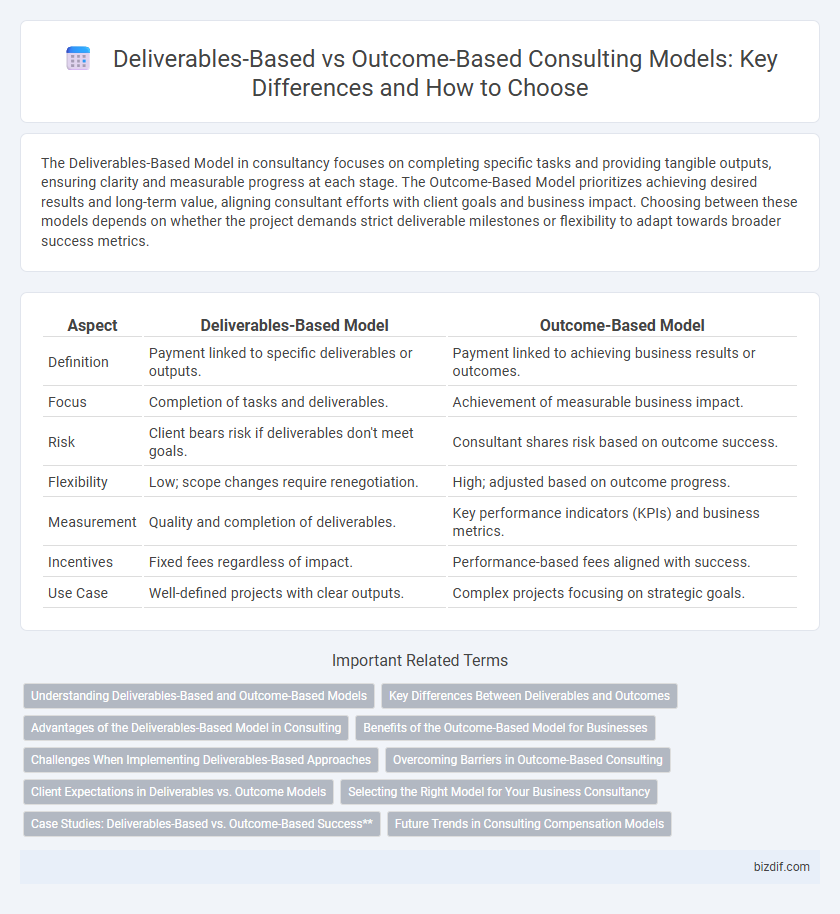The Deliverables-Based Model in consultancy focuses on completing specific tasks and providing tangible outputs, ensuring clarity and measurable progress at each stage. The Outcome-Based Model prioritizes achieving desired results and long-term value, aligning consultant efforts with client goals and business impact. Choosing between these models depends on whether the project demands strict deliverable milestones or flexibility to adapt towards broader success metrics.
Table of Comparison
| Aspect | Deliverables-Based Model | Outcome-Based Model |
|---|---|---|
| Definition | Payment linked to specific deliverables or outputs. | Payment linked to achieving business results or outcomes. |
| Focus | Completion of tasks and deliverables. | Achievement of measurable business impact. |
| Risk | Client bears risk if deliverables don't meet goals. | Consultant shares risk based on outcome success. |
| Flexibility | Low; scope changes require renegotiation. | High; adjusted based on outcome progress. |
| Measurement | Quality and completion of deliverables. | Key performance indicators (KPIs) and business metrics. |
| Incentives | Fixed fees regardless of impact. | Performance-based fees aligned with success. |
| Use Case | Well-defined projects with clear outputs. | Complex projects focusing on strategic goals. |
Understanding Deliverables-Based and Outcome-Based Models
Deliverables-based models emphasize specific, tangible outputs such as reports, software modules, or completed tasks, providing clear milestones and deadlines for consultancy projects. Outcome-based models focus on achieving desired business results like increased revenue, improved customer satisfaction, or efficiency gains, shifting accountability toward measurable impact. Understanding these models helps organizations align consultant engagement with strategic goals and risk tolerance effectively.
Key Differences Between Deliverables and Outcomes
Deliverables-Based Model centers on tangible, specific outputs such as reports, designs, or software modules, with success measured by the completion of these artifacts. Outcome-Based Model emphasizes the achievement of business objectives or benefits, such as increased revenue, improved customer satisfaction, or operational efficiency, linking consultancy value directly to client goals. Key differences include accountability focus: deliverables prioritize task completion, whereas outcomes prioritize measurable impact and long-term value creation.
Advantages of the Deliverables-Based Model in Consulting
The Deliverables-Based Model in consulting provides clear, tangible outputs that align with client expectations and project scope, ensuring transparency and accountability throughout the engagement. This model facilitates precise resource allocation and milestone tracking, which enhances project management efficiency and reduces risks associated with scope creep. Deliverables offer measurable progress indicators, enabling both consultants and clients to monitor results closely and make informed adjustments promptly.
Benefits of the Outcome-Based Model for Businesses
The Outcome-Based Model ensures businesses pay for tangible results, aligning consultancy efforts with strategic objectives and enhancing accountability. This approach drives higher ROI by focusing on measurable business impacts such as revenue growth, cost reduction, or customer satisfaction improvements. It fosters long-term partnerships where consultants are incentivized to innovate and optimize performance continuously, delivering sustained value beyond project completion.
Challenges When Implementing Deliverables-Based Approaches
Deliverables-based models face challenges such as rigid scope definitions that limit flexibility in addressing evolving client needs and potential misalignment between completed tasks and overall business objectives. These models often struggle with unclear expectations regarding quality and timelines, leading to possible disputes and increased project management overhead. Ensuring stakeholder buy-in while maintaining accountability for each deliverable requires meticulous coordination and clear communication throughout the consultancy engagement.
Overcoming Barriers in Outcome-Based Consulting
Overcoming barriers in outcome-based consulting requires clear definition of measurable goals, aligning client expectations with tangible business results, and establishing robust performance metrics. Consultants must foster transparency and continuous communication to navigate uncertainties and mitigate risks tied to ambiguous outcomes. Leveraging advanced analytics and iterative feedback loops enhances adaptability, ensuring deliverables drive the targeted outcomes effectively.
Client Expectations in Deliverables vs. Outcome Models
Client expectations in deliverables-based models center on receiving specific, predefined outputs within agreed timelines, ensuring clarity and measurable progress. In outcome-based models, clients prioritize achieving tangible business results and value creation rather than simply obtaining deliverables, demanding flexibility and alignment with overarching objectives. Clear communication and well-defined success criteria are essential in both models to manage expectations and ensure satisfaction.
Selecting the Right Model for Your Business Consultancy
Choosing between a Deliverables-Based Model and an Outcome-Based Model hinges on your consultancy's goals and client expectations. The Deliverables-Based Model emphasizes specific, tangible outputs like reports or presentations, ensuring clarity and scope control, ideal for projects with well-defined tasks. In contrast, the Outcome-Based Model focuses on achieving measurable business results such as increased revenue or improved operational efficiency, aligning consultant incentives with client success and fostering long-term collaboration.
Case Studies: Deliverables-Based vs. Outcome-Based Success
Case studies highlight that Deliverables-Based Models focus on completing predefined tasks such as reports, audits, or implementations, with success measured by timely delivery and adherence to specifications. Outcome-Based Models prioritize achieving strategic business results like revenue growth, cost reduction, or customer satisfaction improvements, with success tied to measurable impact and value creation. Consulting firms adopting Outcome-Based Models demonstrate higher client satisfaction and long-term partnerships due to aligned incentives and tangible business benefits.
Future Trends in Consulting Compensation Models
Future trends in consulting compensation models emphasize a shift from traditional deliverables-based models to outcome-based models, aligning payments with measurable client success and value generation. This approach integrates advanced analytics and real-time performance tracking to foster transparency and accountability. Adoption of AI-driven tools is expected to further refine outcome assessments, enabling consultants to tailor services dynamically and enhance client satisfaction.
Deliverables-Based Model vs Outcome-Based Model Infographic

 bizdif.com
bizdif.com